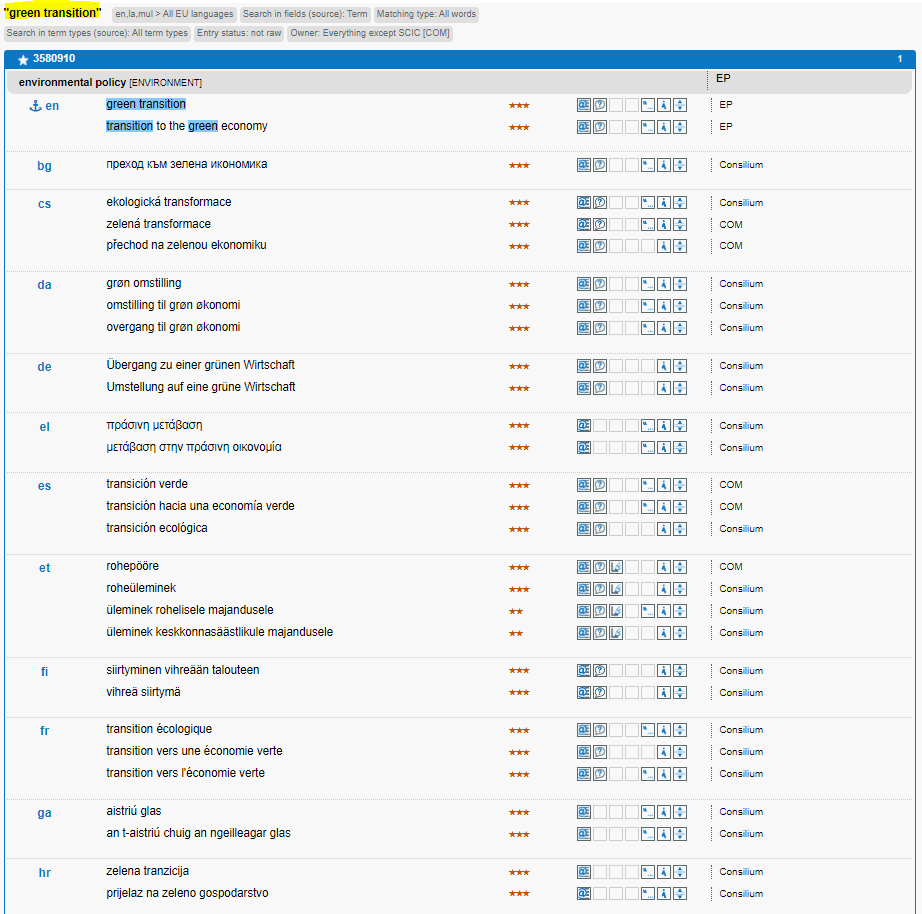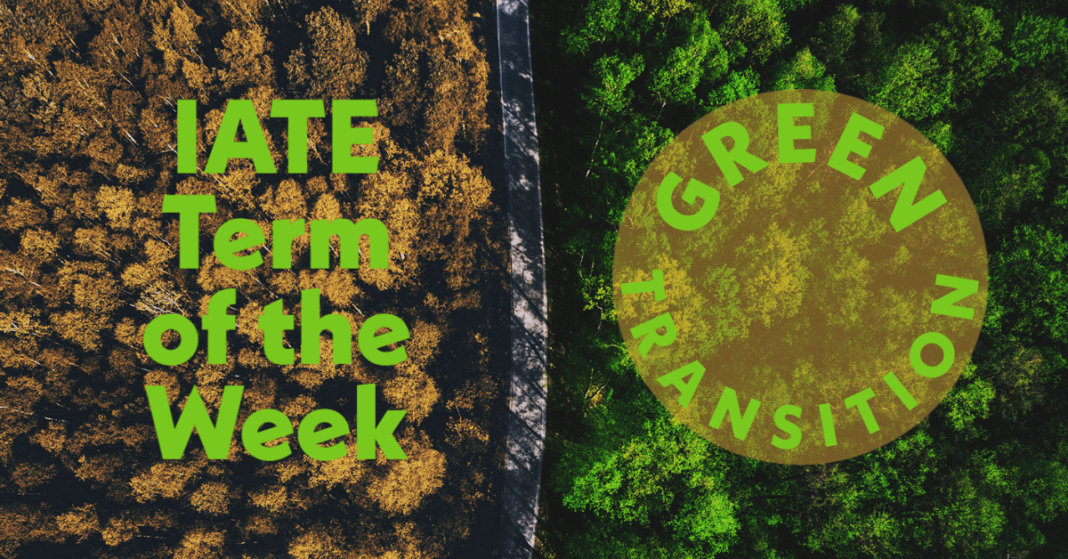Green transition or transition to the green economy (IATE ID: 3580910) refers to the process of shifting towards a more sustainable and environmentally friendly economic model. It involves transitioning from traditional, resource-intensive industries and practices to low-carbon, renewable energy sources, and environmentally conscious production and consumption patterns.
In IATE, this term is defined as the “process of fostering changes from the prevailing economic development paradigm to an economy which generates economic profits while ensuring environmental sustainability and social inclusion”. The green transition encompasses a wide range of sectors and policies aimed at reducing greenhouse gas emissions, mitigating climate change, and promoting the efficient use of resources. It involves transforming energy systems by investing in renewable energy technologies such as wind, solar, and hydroelectric power. It also includes promoting energy efficiency measures to reduce energy consumption and minimize waste.

In recent years, the global community has witnessed an urgent need for a green transition and a shift towards a sustainable future. In this context, the European Parliament has been instrumental in setting ambitious climate targets. In 2019, the EU committed to becoming the first climate-neutral continent by 2050, a commitment further strengthened by the European Green Deal. This comprehensive framework aims to transform Europe into a resource-efficient and low-carbon economy. The Green Deal encompasses various initiatives, including sustainable agriculture, biodiversity protection, and clean energy investments.
Additionally, the EU’s Renewable Energy Directive sets binding targets for member states to increase the share of renewables in their energy mix. The EU Emissions Trading System (EU ETS) has been crucial in curbing emissions by putting a price on carbon and incentivizing industries to adopt cleaner practices. Furthermore, the EP has taken steps to ensure a just and inclusive transition. Through the Just Transition Mechanism, the EU provides financial support to regions heavily dependent on fossil fuels, helping them transition to greener industries and providing support for reskilling and retraining workers.
Overall, the European Parliament has played a pivotal role in advancing the green transition and shaping the green economy. Its commitment to ambitious climate targets, introduction of legislation, funding programs, and efforts towards a just transition have been instrumental in driving sustainable development within the EU. By leading the way in implementing effective policies and measures and in tackling the pressing challenges of climate change, the European Parliament is setting an example for the global community with the hope of creating a greener and more prosperous future for all.
Related terms: green transformation (IATE ID: 3588237), InvestEU Green Transition Investment Facility (IATE ID: 3628085), proposal for a Directive on empowering consumers for the green transition (IATE ID: 3627600), twin transitions (IATE ID: 3589036), Osnabrück Declaration on vocational education and training as an enabler of recovery and just transitions to digital and green economies (IATE ID: 3592900)
References
European Council (2019). “European Green Deal”. Accessed May 2023. Online available at : https://www.consilium.europa.eu/en/policies/green-deal/
European Parliament (2023). “Green Deal: key to a climate-neutral and sustainable EU”. Accessed May 2023. Online available at: https://www.europarl.europa.eu/news/en/headlines/society/20200618STO81513/green-deal-key-to-a-climate-neutral-and-sustainable-eu
European Parliament (2023). “The European Green Deal”, in Legislative Train Schedule. Accessed May 2023. Online available at: https://www.europarl.europa.eu/legislative-train/theme-a-european-green-deal/file-european-green-deal
United Nations Institute for Training and Research (UNITAR) (2013). Partnership for Action on Green Economy (PAGE). Green Economy Introductory Learning Materials, Definitions for Green Economy, p. 8.
Written by Victoria Saura Montesinos
 | Born in Murcia, Spain, her academic background includes a Double Degree in Linguistics and Applied Languages and English Studies at the University of Cadiz and Loughborough University (Erasmus+), and a Master’s degree in Spanish as a Foreign Language (Mid Atlantic University). With the aim of continuing her research career, Victoria is currently doing a PhD in Applied Linguistics, with a scientific interest in Terminology and Specialised Communication, Lexical Semantics, Corpus Linguistics and Digital Linguistics. |

